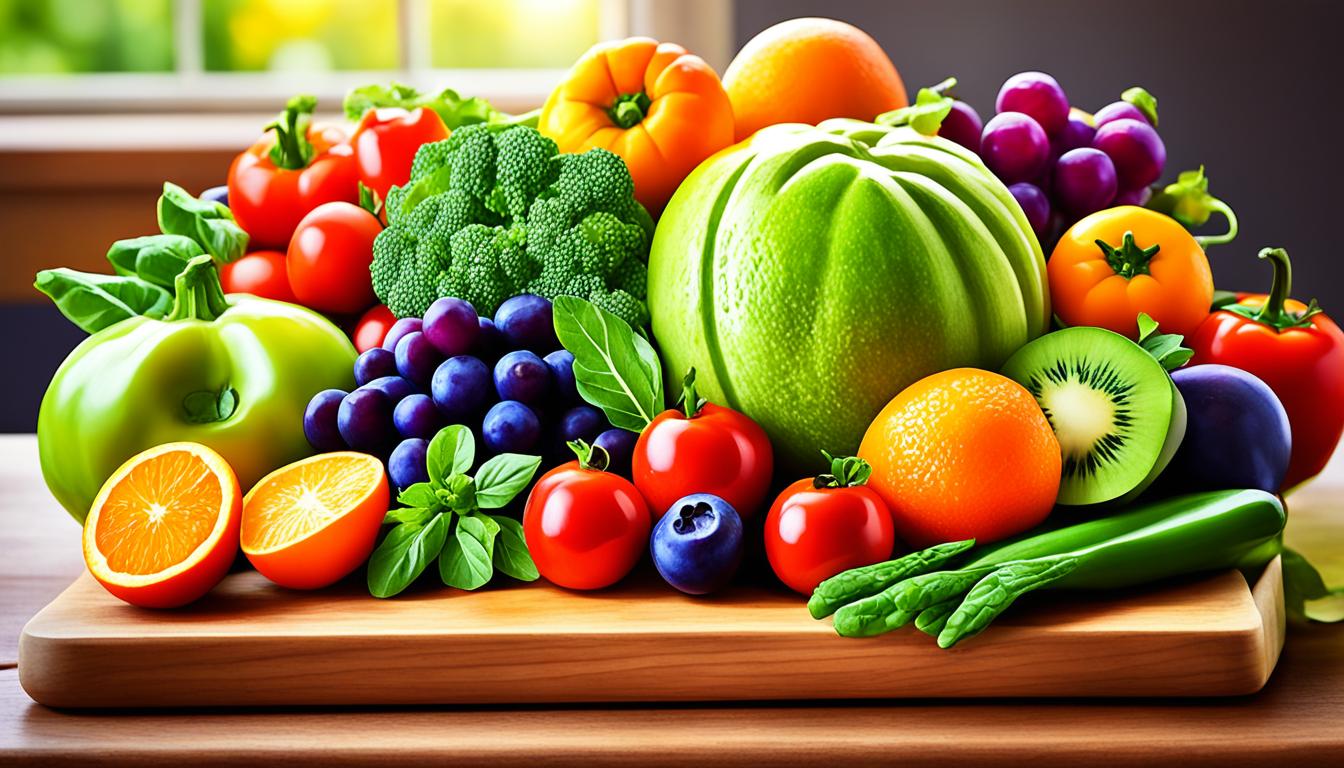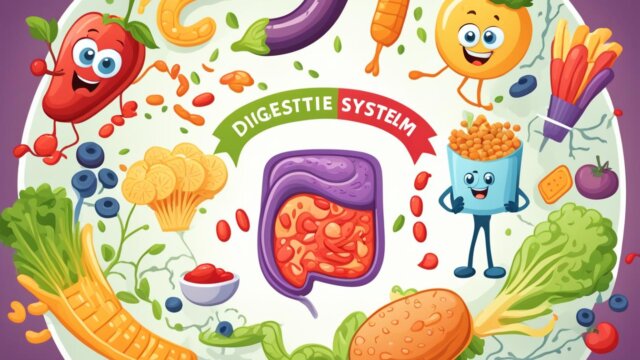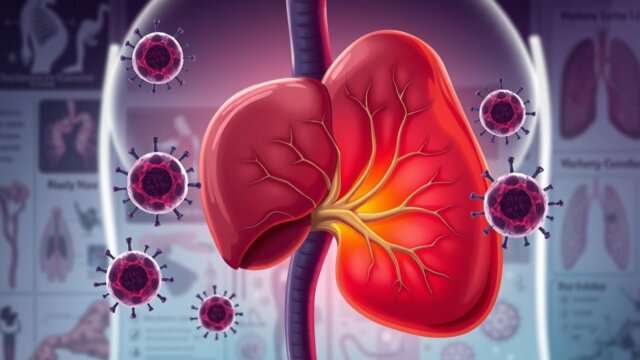FTC disclaimer: This post may contains affiliate links and we will be compensated if you click on a link and make a purchase.
One serving of organic whole foods meets your body’s need for many vital nutrients. These include enzymes and phytonutrients. They all work together to improve your health and well-being. Unlike supplements, your body easily uses the nutrients in whole foods.
With the power of enzyme-rich whole foods, you let nature fully nourish your body. It revitalizes you from inside out.
Importance of Enzyme-Rich Whole Foods
Organic enzyme rich whole foods are full of important nutrients. They have vitamins, minerals, antioxidants, and phytonutrients. These foods work together to keep us healthy, unlike artificial supplements.
Nutrient Density and Completeness
The mix of nutrients and cofactors in whole foods helps our body use them better. This way, we get the most out of what we eat or take as supplements.
Enhanced Bioavailability
Organic whole foods are easy for our body to absorb. This makes sure we can use the plant enzymes, raw foods, and digestive enzymes they offer.
Eating enzyme-rich whole foods can unlock a lot of natural nutrition. It gives our bodies the complete care they need to do well.,
Enzyme Rich Whole Foods
Organic enzyme rich whole foods are full of important nutrients. These include vitamins, minerals, and antioxidants. They also have phytonutrients. Whole foods give us a mix of nutrients that work together for our health. This makes them better than just taking vitamins. They are easy for our bodies to use because they are natural.
Organic whole foods have lots of phytonutrients too. These are special plant compounds. They make food look and taste good. But, they also help our health. They fight damage in our cells. They reduce swelling and help our bodies fight off sickness.
Eating enzyme-rich whole foods is good for us. It helps get all the goodness from food. This boosts our health all around. Plant enzymes are key. They are in foods that aren’t cooked or that are fermented. Plant enzymes help our bodies break down food. This makes it easier for us to take in all the good stuff.
If you want to be healthy, enzyme rich whole foods are your friend. They help your enzymes work better. This means food gets digested well. They give us what we need from nature to be strong and lively.
Role of Enzymes in Digestion
Whole foods give us vital nutrients and are rich in fiber and natural enzymes. The pancreas, an essential organ, makes enzymes such as amylase, lipase, and protease. These enzymes break down foods like carbs, fats, and proteins. This process helps our body absorb these nutrients better.
Breaking Down Nutrients
Fiber is key for a healthy gut and smooth digestion. Some people might not have enough enzymes because of genetics or health issues. This can lead to digestive problems. Taking organic supplements can support your digestion.
Unlocking Nutritional Benefits
If someone doesn’t have enough enzymes, they may feel pain, bloating, or lose weight. This signals a need for medical care. Doctors might recommend pancreatic enzyme replacement therapy (PERT). This helps the body process food well and absorb nutrients.
Benefits of Plant Enzymes
Whole foods bring us important nutrients, fiber, and natural enzymes. These enzymes help our body absorb nutrients better by breaking them down. Using organic supplements can give our digestion the extra help it needs.
Improved Nutrient Absorption
Plants have enzymes that make it easier for our body to use the good stuff in our food. Some supplements have things like amylase and lactase to help our stomachs too. These can make food processing and nutrient use better, especially if someone lacks these enzymes.
Supporting Gut Health
Fiber helps our digestion work smoothly and keeps our gut’s good bacteria happy. Probiotics do something similar, but they help our gut without breaking down food. Using probiotics can make tummy issues like bloating and gas better in many people.
Problems with enzymes can be due to genes, birth, or diseases like pancreatitis or cancer. The pancreas makes key digestive enzymes for handling carbs, proteins, and fats.
Taking papaya can make IBS symptoms less bothersome, like bloating or constipation. For 34 women, eating two bananas daily meant less bloating in a study. Kefir also helps some people digest dairy better, reducing discomfort.
Raw Foods and Their Enzyme Content
Organic whole foods are full of important nutrients. They have vitamins, minerals, and more. This mix of nutrients works together to keep us healthy. These foods are easy for our bodies to use because they are natural.
These foods also have fiber and natural enzymes. Enzymes are helpful in breaking down food so we can use the nutrients better. Foods like avocados, raw pineapples, and papayas contain important enzymes.
Some processed foods contain added digestive enzymes. Examples are kefir, sauerkraut, and kimchi. Honey also has enzymes. They help in breaking down different kinds of food.
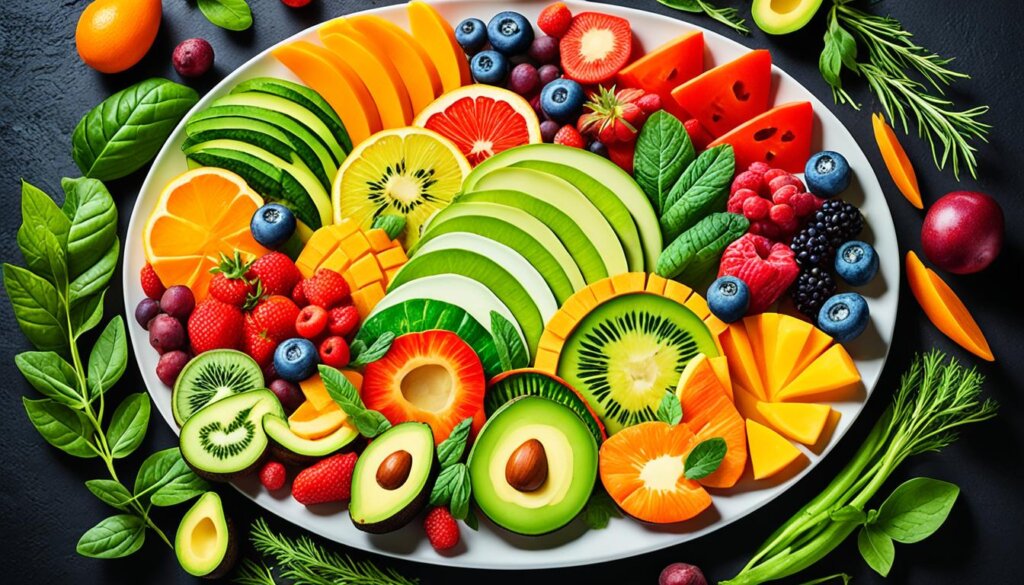
Eating a mix of raw, enzyme-rich foods is good for us. This supports our digestion naturally.
Enzyme-Rich Whole Foods | Digestive Enzymes Present |
|---|---|
Avocado | Lipase |
Raw Pineapple | Bromelain |
Papaya | Papain |
Kefir | Lipase, Proteases, Lactase |
Sauerkraut | Variety of Digestive Enzymes |
Kimchi | Proteases, Lipases, Amylases |
Honey | Diastases, Invertases, Proteases |
Sprouted Grains: A Powerhouse of Enzymes
Organic enzyme rich whole foods such as sprouted grains are full of key nutrients and natural enzymes. These can change your health. The sprouting process of whole grains offers many benefits. It turns them into a top choice for enzyme nutrition.
The sprouting process gets rid of antinutrients like phytic acid in whole grains, letting important vitamins and minerals be used. Unlike non-sprouted wheat, sprouted whole wheat has more folate. Sprouted grains offer more antioxidants and polyphenols. This is great for your health.
Some say that sprouted whole grains might affect blood sugar less than unsprouted ones. Also, sprouting lessens the gluten in grains. This makes sprouted whole grain bread easier to digest for some.
Enzymes in sprouted grains break foods down better, letting the body absorb more nutrients. This helps get all the good stuff from the vitamins, minerals, and amino acids in these foods.
The enzymatic activity in sprouted grains can help improve digestion. It turns carbs into simple sugars. This could mean less tummy trouble from eating grains.
Taking in sprouted grains is a good step for your health. By eating these enzyme rich whole foods, you open the door to many health benefits. From better nutrient intake to smoother digestion, enzyme rich whole foods can make a big difference.
Fermented Foods: Enzyme-Rich and Gut-Friendly
Organic whole foods have many nutrients. They include vitamins, minerals, antioxidants, and phytonutrients. Whole foods give us a mix of nutrients that help our health. They also have fiber and natural enzymes. These enzymes help our body use nutrients.
Probiotics and Enzymes
Fermented foods are full of enzymes and probiotics. They work together to keep our gut and digestion healthy. Eating kimchi can lower insulin resistance, blood pressure, and body weight. This happens after 16 weeks. More kimchi can also lower blood sugar, cholesterol, and bad LDL cholesterol in a week.
If you eat kefir for 6 weeks, you can lower inflammation markers. Tempeh, made from soy, can lower bad and total cholesterol. Natto helps lower bone loss in postmenopausal women. Drinking kefir can improve bone strength in a study with 40 people.
Yet, not all fermented foods may be that good. Drinking too much miso soup can raise the risk of stomach cancer.
However, a study of 21,852 Japanese women linked miso soup to a lower breast cancer risk. Men who drink a lot of miso soup might face a higher stomach cancer risk.
Eating sauerkraut can help with IBS. A Norwegian study found it improved symptoms for a group with IBS.
Fermented foods are great for our gut thanks to enzymes and probiotics. Food like powdered milk with probiotics has 5% of their benefits. Worldwide, food guides recommend 7% of fermented foods in our diet. Foods and drinks made by fermenting have 4% of beneficial microbes.
The process of making pulque changes 12% of the bacteria community. High-tech tools find new beneficial bacteria in cheeses, making up 3% of them.
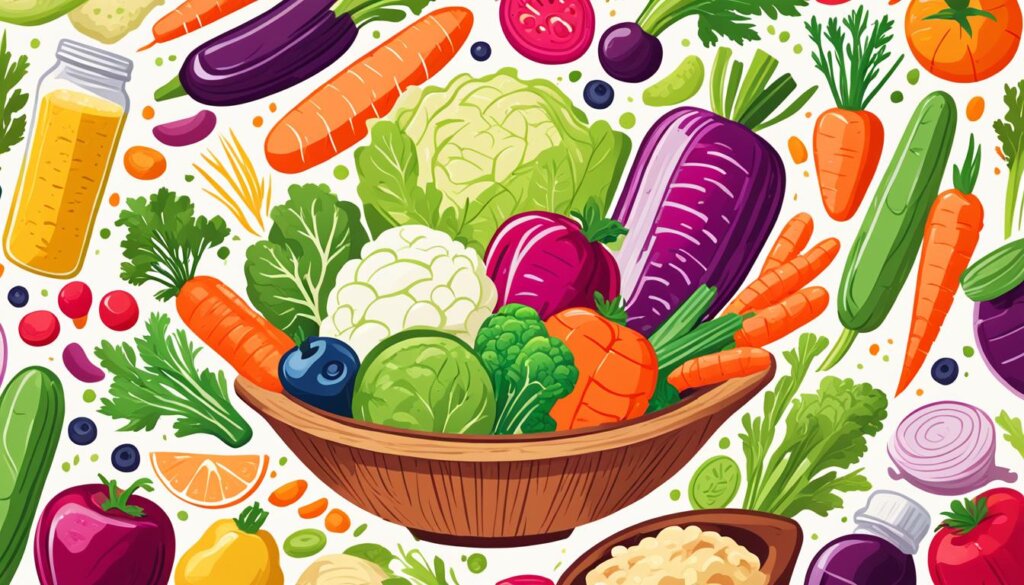
Enzyme Supplements: An Alternative Source
Enzyme-rich whole foods are the best for essential digestive enzymes. But, sometimes, our diets do not provide enough enzymes. Enzyme supplements offer a good alternative for this.
Types of Enzyme Supplements
Enzyme supplements come in many forms, each designed for specific digestive needs. They can include enzymes like amylase, lipase, and protease. These help break down food better. Lactase enzymes are great for people with lactose intolerance.
They can lessen symptoms when used in the right amounts. For fructose intolerance, supplements like Fructaid can aid in absorption.
Choosing Quality Supplements
Choosing enzyme supplements means looking for high quality and variety. Nature’s Way offers Lactase Enzyme capsules. Seeking Health has Histamine Block with targeted enzyme benefits. FODMATE by Microbiome Labs is great for FODMAP digestion. FODMAPs are fermentable carbs that can upset the stomach.
Remember, enzyme supplements are not for everyone. They may not be good for those with galactosemia or certain diabetes medications. Always ask a healthcare professional before you start using enzyme supplements.
Enzyme Rich Whole Foods: A Dietary Approach
Adding enzyme rich whole foods to your meals is key to better health. These foods are packed with vitamins, minerals, and antioxidants. They also contain fiber and plant enzymes for easy digestion and better nutrient use.
Incorporating Enzyme-Rich Foods
Eating a wide variety of enzyme rich whole foods is very beneficial. Great sources of plant enzymes are raw fruits, veggies, sprouted grains, and fermented foods. By eating these foods, you help your body get more nutrients and keep your guts healthy.
Balancing Cooked and Raw Foods
It’s good to cook some foods for taste and easier digestion. But it’s also vital to eat some things raw. This ensures your body gets all the enzymes and nutrients it needs. Combine cooked and raw enzyme rich whole foods for the best nutrition.
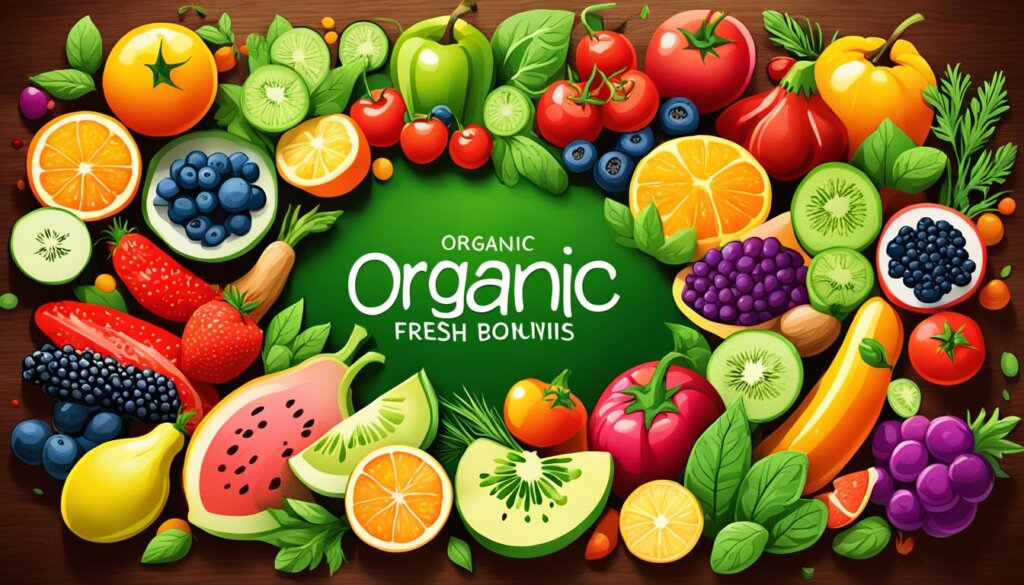
Make enzyme rich whole foods a big part of your diet. This will boost your health and well-being. Enjoy the many health benefits from the plant enzymes, fiber, and vital nutrients in these foods. They help keep your digestion working well, too.
Overcoming Digestive Challenges
Our body’s natural digestive enzymes go down as we get older. This can make digesting food and taking in nutrients harder. Several things like diseases, not enough stomach acid, genes, and surgeries can lower enzyme levels.
Signs that you might not have enough digestive enzymes are feeling gassy, bloated, or sick after eating. You may have pain in your stomach area, acid reflux, or loose, greasy stools. Not having enough enzymes can cause malnutrition. This can lead to health problems like weak bones, nerve damage, tiredness, or issues with blood clotting.
Aging and Enzyme Deficiency
Things like stress, what you eat, and the balance of good and bad bacteria in your gut can affect how well you digest food. Too much stress might make you develop ulcers or upset your stomach. It can also cause constipation or make you run to the bathroom more. If you don’t drink enough water, you might get stopped up.
Chewing your food well helps your body get more nutrients from it. Moving your body regularly can make your gut work better. This might help if you have diseases that cause your gut to be inflamed.
Digestive Disorders and Enzyme Therapy
Taking enzyme pills can make it easier to digest food, especially as you get older. These supplements are good for people who don’t have enough enzymes naturally. They can make tummy troubles better and help your body get more nutrients from food.
There are many types of these pills, like ones from pig pancreas or others for folks who can’t have dairy. If you have a gut problem, using enzyme therapy can be a big help. It can make the signs of these diseases less severe and keep your gut healthier.
You can buy extra enzymes at the store, either alone or mixed with others. They come from things like papayas, pineapples, and animals. Sometimes, these pills can upset your stomach, cause you to feel sick, or give you loose stools, especially if they’re not liquid. Be careful if you have allergies, some enzyme pills have things you might react to.
To help your stomach work better, eat foods full of enzymes. Also, make sure your gut is healthy. If you still have problems, enzyme supplements can be a good idea to think about.
Enzymatic Impact on Overall Health
Organic whole foods are packed with phytonutrients. These come from plants, adding vibrant colors and flavors. Phytonutrients are known for antioxidants, reducing inflammation, and helping the immune system. When you choose supplements based on whole foods, you get these benefits. They improve your health and fight off diseases.
Reducing Inflammation
Enzymes are key in lessening inflammation. Whole foods rich in enzymes can control your body’s inflammatory reactions. This makes your body healthier and more balanced.
Supporting Immune Function
Enzymes in organic foods also support the immune system. They help your immune system work well. So, your body can fight off germs and stay healthy.

Enzyme Rich Whole Foods: A Nutritional Powerhouse
Organic enzyme rich whole foods are full of vitamins, minerals, and antioxidants. These nutrients work together to keep us healthy. Since they are natural, our bodies easily use them. They also include fiber and plant enzymes. These help us absorb nutrients better.
By eating lots of whole foods, you tap into nature’s best. This boosts your health and well-being.
Many with cystic fibrosis need help digesting food. They lack enzymes and have to take digestive enzymes, like PERT, to eat properly. This enzyme problem can come from genetics. It might happen at birth or later on. Various health issues can also cause enzyme shortage, like pancreatitis or cancer.
For digestive troubles like acid reflux, people use digestive enzyme supplements. But, the FDA doesn’t control these products closely. The pancreas makes important enzymes that help us digest, like amylase and lipase. Sometimes, the body doesn’t make enough enzymes. This can make it hard to digest food right.
Diets rich in fruits, vegetables, whole grains, and nuts make our heart and blood vessels healthier. The Mediterranean diet is very good for you. It includes lots of fruits, veggies, nuts, and fish. This diet lowers the chance of heart problems. It also helps prevent diabetes by making our bodies use insulin well. Eating plenty of fiber keeps you feeling full and helps control your weight.
Eating lots of fruits, veggies, and whole grains lowers the risk of certain cancers. The fiber and vitamins in these foods protect our guts. Choosing whole foods reduces the risk of dying early. Foods high in fiber lower the chance of many health problems.
If you don’t have enough digestive enzymes, you might feel sick. Symptoms can range from belly pain to weight loss. Probiotics and digestive enzymes do different jobs.
Probiotics keep our stomachs healthy. Enzymes help us break down food. Enzyme problems can be from birth or happen later. This might be due to illness or medical treatments.
Conclusion
Adding organic enzyme rich whole foods and enzyme-rich supplements is great. It helps your body get important nutrients. These foods are good for you and the earth. They also help your digestion and lower how much toxins you get. This is all good for your health.
Eating organic whole foods and enzyme-rich supplements is the way to go. It helps your body in many ways. For example, plant sterols and stanols can help lower bad cholesterol. Flaxseed is good for controlling cholesterol in some people.,
Enzyme-rich whole foods can do wonders for you. They can improve how you feel and give you more energy. Eating lots of different omega-3 plant foods is also smart. It’s good for your health and the planet.
FAQ
What are the benefits of incorporating organic whole foods into my diet?
Organic whole foods are full of vital nutrients like vitamins and minerals. They have antioxidants and phytonutrients. These nutrients work hand in hand to keep us healthy. They are easy for our body to use.
How do enzymes in whole foods support digestion and nutrient absorption?
Whole foods also bring fiber and natural enzymes. These enzymes help our body absorb nutrients better. Choosing organic supplements supports our digestion greatly.
What are the benefits of incorporating enzyme-rich foods like fermented and sprouted foods into my diet?
Fermented foods and sprouted grains are great for our gut. They are full of enzymes that aid digestion. They also promote overall health.
When might enzyme supplements be beneficial, and how do I choose a quality product?
Some may need enzyme supplements to get all their nutrients. Look for supplements with many plant-based enzymes. High-quality, diverse formulas are key.
How can I optimize the benefits of enzyme-rich whole foods in my diet?
Adding various enzyme-rich foods to your diet is crucial. Balance raw and cooked food intake. This ensures you get enough enzymes and nutrients.
How do enzymes impact overall health beyond digestion?
Enzymes do more than aid digestion. They can help lower inflammation and boost the immune system. Using organic supplements can greatly improve our health and help prevent diseases.
